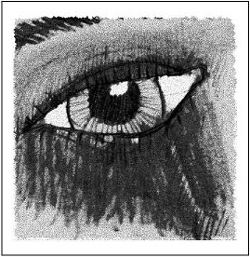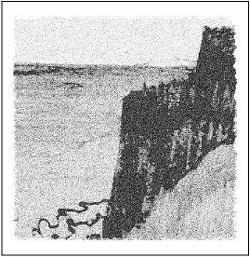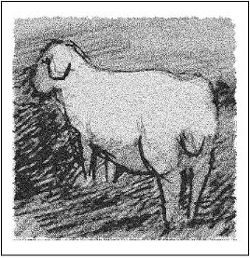The Dark Horse (5 page)

14

Gudrun did not seem to be too badly hurt. The broken edge of Cold Lightning had sliced through her dress and made a messy cut across her stomach, but it was not deep. But she was the Wisewoman. She was the one who mended arms and delivered babies. The one who tended people’s wounds. There was no one to look after her.
15

The white man picked up Sigurd’s body and carried him across his shoulders like a dead deer. He felt cold again, though it was a warm day. His head swam a little every now and again, and he had to stop. Sweat ran freely from his face.
The boy couldn’t have come far from where he lived. He had nothing with him—no pack, no food, nothing. He hoisted the boy’s body higher onto his shoulders and set off along the coast, north. Back the way the boy had come.
16

There were times when we’d have been truly lost without Mouse.
I was away when Horn’s sword tip flew across the fire pit and cut Gudrun. Mouse told me all about it later. She seemed confused and told the story badly. She was upset because I had run away.
I was stupid. It still shames me to think that I ran away from the village. I don’t suppose I really meant to go anywhere, but I went far enough to cause trouble, and while I was gone, Gudrun got hurt by Horn’s anger and impatience.
17

The morning after the sword broke, Horn summoned Mouse. Forlornly she walked around the side of the great broch to the Lawspeaker’s dwelling. Standing not too far away from the great meeting place was the next most impressive broch in the village. This broch was larger than the ones the other Storn lived in and was also different in that it was not round, but a long rectangle. This gave it the sense of having two distinct ends inside, almost like two rooms.
Mouse was miserable. She had tried to find Sigurd and had failed.
She’d had no trouble finding a bird, not an eagle as she’d hoped, but a sparrow hawk. Nearly every bit as good. She’d spotted it away to the south, heading down the coast, just as she’d needed. But as she had lain on her back on the high hill she’d flown as far as she could before she lost contact with the bird, and she had neither seen nor felt a single hint of Sigurd.
Either he was dead or injured and she could not reach him, or he had traveled far and fast. Neither of these things made Mouse happy, and as a result she cared little about why Horn had called her to him.
Horn stared at Mouse for a long time. While she waited, Mouse looked around her, rather than meet his searching eyes. Horn’s broch was not only larger than the others, it was also very different inside. It seemed to contain more possessions than the rest of Storn put together. The walls were hung with all manner of things—weapons, clothes, pots . . . too many things to take in at one go. Mouse guessed that these were the belongings of all the previous Lawspeakers who had lived here. The floor was more richly covered than any she had seen before, with thick, many-colored rugs.
When he finally did speak, Horn mentioned neither the box nor Sigurd.
Picking his words carefully, now Horn did not look her in the eye.
“Gudrun has asked for you. You will do as she says. Follow her instructions carefully.”
Mouse scratched her nose. This was something. It was obviously very irritating to Horn to have to ask for Mouse’s help again. The second time in just a few hours, and the last time had ended badly for Horn. Mouse had heard people complaining about him openly; the atmosphere in the village was becoming more and more strained.
Horn seemed to have finished speaking. Mouse dared to ask a question.
“What am I to do?”
“Gudrun is hurt. She has asked that you nurse her wound. You will do what she says. There is nothing more to say. Go to her now.”
Mouse went.
18

I had promised to be Mouse’s brother. I knew it meant more than that. She wanted someone who would be true to her, always. Dependable. Someone whom she could trust. I had let her down.
Why was this so important to her? I had begun to find out a little. About her time with the wolves. Though nothing about the time before that. But it was difficult because she never seemed to want to talk about things much.
One day, though, as we were gathering sea cabbage in the high-tide line she said, “Sig, how long have you lived here?”
I didn’t understand the question at first. At least, I thought I must have missed something.
“All my life, of course. Why?”
She shrugged and said nothing, but a few minutes later she spoke again, without looking up.
“So Freya and Olaf have always been your mother and father, then?”
“Of course.”
She said nothing more, but I thought it might be worth trying to ask her a question or two.
“Who were your parents, Mouse?”
The answer she gave me brought a chill to my heart and a lump to my throat.
“The wolves,” she said, and threw another piece of seaweed into our basket.
19

“Where’s your brother, then?”
It was Sif. She’d been hanging around outside her father’s broch. Waiting to ambush Mouse. Mouse had managed to avoid her since she produced the box at the Spell-making. But there was no avoiding her now.
“Well?” she said spitefully. “Where is he? I thought you two went everywhere together.”
Mouse ignored her and tried to walk past, but Sif blocked her way.
“Don’t ignore me.”
Why now, why? thought Mouse. Leave me alone.
Sif was nearly as old as Sigurd and was much taller than Mouse. Mouse knew from experience that she was stronger, too.
“Things to do, Sif. Let me past.”
“Who do you think I am? Don’t try to ignore me. You and your stupid brother, you think you’re stronger than me? You’re wrong!”
Mouse’s lips quivered. She hated herself. She was so weak, she couldn’t even take being bullied by this fool.
“I’m busy, Sif. Your father—”
“How did you open the box?” demanded Sif, angrier now.
“Be quiet,” said Mouse without thinking.
Sif hit Mouse across the face with the back of her hand. Mouse dropped to the ground, holding her cheek. She felt blood rush into her face, and she looked up to see Sif glaring at her. Anger and joy made her ugly. She spat at Mouse.
“Get up,” she said. “No one tells me to be quiet.”
Mouse looked up at Sif, who was ready to strike again.
“Why do you hate me?” she asked.
This stopped Sif for a moment. Mouse looked at her. She was the Lawspeaker’s daughter. She was actually quite beautiful, with long, straight, dark hair. She was also cleverer than many of the villagers. She had a lot she could be happy about, and Mouse did not understand why she wasted so much time picking on her.
Sif stamped her foot.
“Get up!” she shouted.
Mouse stayed where she was.
“You and that boy!” Sif said.
She meant Sigurd. Her statement was without apparent meaning, but in reality full of a message to be heard. Now Sif made as if to kick Mouse where she sat. But Sif hadn’t seen her father standing behind her, and as she took the step toward Mouse he swept Sif off her feet with his boot.
Sif made an unintelligible noise and rolled over. She cried a little girl’s cry.
“Father!”
“Go inside, Sif,” said Horn.
“But she should tell us how she—”
“Inside. Now.”
There was a brief moment in which Sif decided to keep her mouth shut. She flung an angry look at Mouse but did as Horn said.
He turned to Mouse.
“Thank you . . . ,” Mouse began.
“I thought I gave you a job to do,” said Horn.
Mouse ran to Gudrun’s hut.
20

Things got easier for Mouse once we gave her work to do. After she’d been found sleeping with the dogs, Father decided that it would be better if she helped do something. That way someone could always keep an eye out for her.
She seemed happier once she had things to do, though Horn saw to it that she did only the most menial work. I wanted to be with her, so I gave up my place in the prow of one of the fishing boats. It meant I was giving up the prestige that could one day have been mine—in charge of a boat—but I was happy to do it, even if it did mean hunting for scraps in the tide line. I remember those early days with some fondness. I would watch Mouse moving easily and stealthily across the rock pools and marvel at her. For a while you could forget she had grown up living as a wolf, and then something like that would remind me that I really knew so little about her.
And Mouse began to talk more, and we grew up together, though she stayed small and delicate, while I grew as tall as I am now. And she never lost the strange edge to her voice. Another reminder of her past, of those years when she couldn’t have uttered a single sound. Well, not a human one, anyway.
Still, she wouldn’t say much about her early life. I think she didn’t know that much. On several occasions I found her crying. The first time I was really frightened by it.
“What’s wrong?” I asked, but she wouldn’t reply.
“What’s wrong, Mouse?” I asked again and again, until finally she replied.
“Bad dreams,” she said.
She told me a little, but only a little.
“Darkness,” she said. “Darkness all the time. I’m alone on a hill in the darkness.”
“But you like the darkness,” I said, thinking about when she had first arrived, how she had always tried to find dark places to sleep, to be.
She nodded.
“Yes,” she said, “I do. That’s not what’s wrong. . . .”
But she couldn’t, or wouldn’t, tell me what was.
Bad dreams, she’d said, but I wonder now if they weren’t actually bad
memories.
Things were good for a few years after Mouse came. She grew up with us, and one Lamb-month would pass into the summer, and then Harvest-month would pass into the slaughtering of the sheep in Blood-month, and we’d find ourselves in the long winter.
I can remember evenings in our broch, when things were well. Olaf sitting, resting after a hard day’s work. Freya cooking and seeing to the fire. Mouse and I playing on the floor. I showed her many things, things that were simple enough to me but that seemed to be magic to Mouse.
I showed her the way to tie the knots that made our fishing nets. She stared in wonder as I made a tiny net from some woollen thread of Freya’s. She laughed, and Freya and Olaf laughed with her. I stared at the strange girl who had become my sister as she held the toy net up to her face by the firelight and tried to see how it had been done.
“Time to eat now,” Freya would say when our games were done, and eat we did, for there was no hunger then.
And the pattern of the years repeated itself again, and things were well enough. But then the world began to change, and the suffering began.
At first it was just harsher weather. Cold, wet winters followed by barren, rainless summers. Crops failed too often, and no one could explain why. The sheep went hungry and many lambs never survived even halfway to Blood-month. And the fish— that was the worst part. Day after day could pass without a single decent catch.
It put the Storn under pressure. It was like a tinderbox waiting for a spark, and I think now that the spark was when we found the box. Take one example. Horn, who had never been the most coolheaded of men, was driven crazy by the thing. It tormented him. And the result? The tip of his sword lands in Gudrun’s stomach. He injures the Wisewoman, so important to so many of us.
But it was to be worse yet for Horn.
